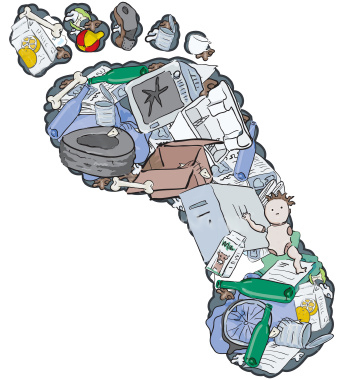Climate Change and Waste
Our Wasteful Impact on Climate Change
Rising levels of greenhouse gases in the Earth’s atmosphere are already changing our climate. Some of these emission increases can be traced directly to our solid waste. Solid waste contributes directly to greenhouse gas emissions through the generation of methane from the anaerobic decay of waste in landfills, and the emission of nitrous oxide from our solid waste combustion facilities. Both of these greenhouse gases have high global warming potential: methane has 21 times the warming potential of carbon dioxide and nitrous oxide has 310 times the warming potential.
 |
|
|
The CT Climate Change Action Plan includes source reduction and recycling as a key strategy to reduce greenhouse gas emissions. In fact, of the 55 strategies in the plan, recycling 40% of our municipal solid waste falls within the top ten actions in terms of quantity of projected greenhouse gas reductions. The revision of the source reduction/recycling goal to 58% will result in even greater greenhouse gas reductions.
Although sanitary landfills in Connecticut are closed to municipal trash and only accept bulky waste, our old/closed landfills will continue to generate methane for years to come. We do, however, have control over how much trash we put in our bulky waste landfills and how much we burn in waste-to-energy facilities. We can reduce our waste, reuse our resources, and recycle our waste to reduce emissions – reducing our greenhouse gases!
Learn More
Climate Change (DEEP)
Climate Change and Waste, U.S. Environmental Protection Agency
Climate Change Waste: Tools & Resources, U.S. Environmental Protection Agency
Materials Management Approaches for State and Local Climate Protection, 2010, EPA Regions 9 and 10
Closing the Loop: Reducing Greenhouse Gas Emissions and Creating Green Jobs Through Zero Waste in British Columbia, March 2013, Climate Justice Project
Stop Trashing the Climate, June 2008, Stop Trashing the Climate
Pay-As-You-Throw: A Cooling Effect on Climate Change, U.S. Environmental Protection Agency, March 2003
Climate Change and Waste: Reducing Waste Can Make a Difference, U.S. Environmental Protection Agency, 2003
ZeroWaste, Recycling and Climate Change, Bill Sheehan, Grassroots Recycling Network, October 2000
WasteWise: Climate Benefits from Reducing Waste, U.S. Environmental Protection Agency, October 1999
Composting: A Greenhouse Gas Mitigation Measure, Californians Against Waste
CT Climate Change: Implications for Solid Waste Management - PowerPoint presentation – Lynn Stoddard, DEEP, CT Solid Waste Management Advisory Committee, August 2007
Northeast Forum on Climate-Waste Connections Webinar Series. Sponsored by EPA Regions 1 and 2. Three webinars on the topic of Climate Change and Waste:
What is the Climate-Waste Prevention Connection?
Make Materials Management Count: Tools & Techniques
Working Together: Reducing GHG through Materials Management
Content Last Updated February 2020

